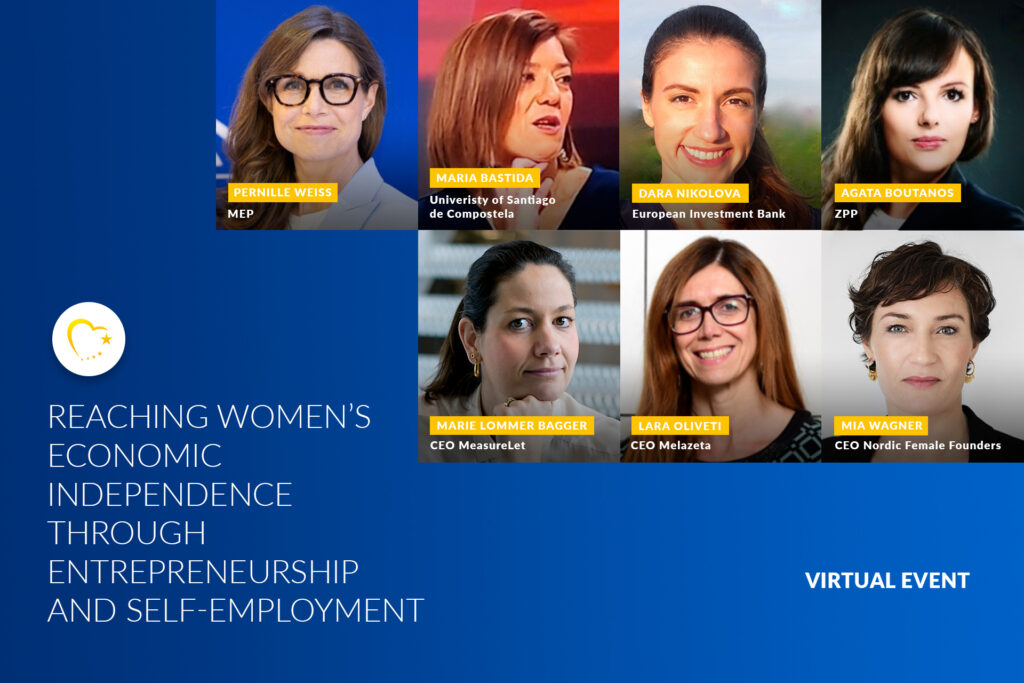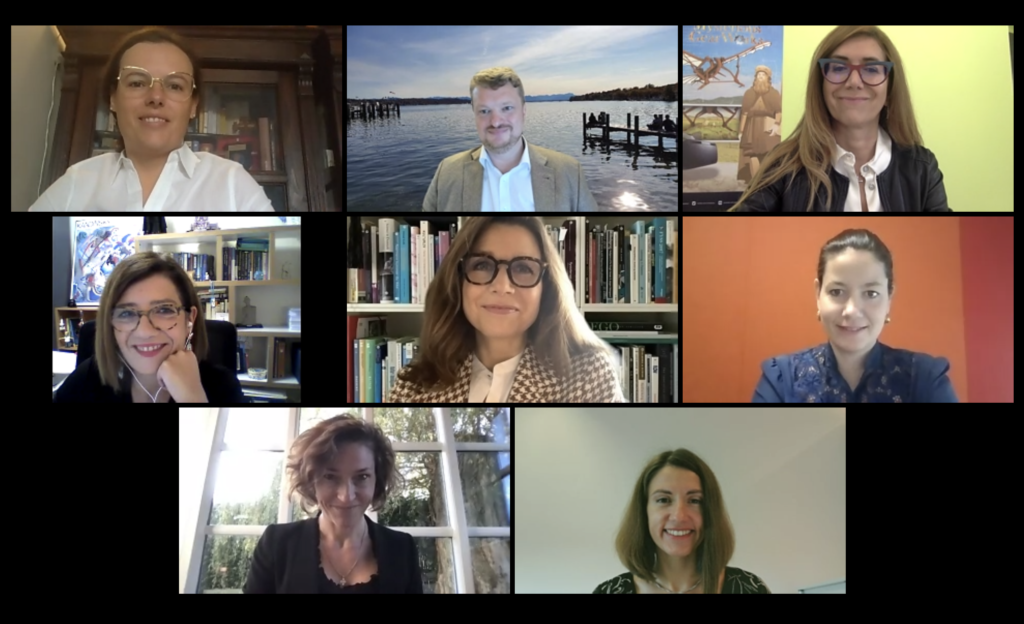Reaching Women’s Economic Independence Through Entrepreneurship and Self-Employment

Women make up 52% of the total European population but only 34.4% of the EU self-employed and 30% of start-up entrepreneurs. Also, a visible presence of female business angels and investors doesn’t mean higher investments in female-founded companies.
Despite the increasing number of public policies and institutional resources designed to promote women-led business, the entrepreneurship gender gap still persists.
What are the constraints that women face when deciding to become entrepreneurs? What factors attract women’s interest and motivate them to start their own business? In our pursuit of finding answers to these questions we brought together Pernille WEISS MEP, Rapporteur on “Reaching Women’s Economic Independence Through Entrepreneurship and Self-Employment” in the FEMM Committee; Board Member of SME Europe of the EPP; Maria BASTIDA, Associate Professor of Economics at Univeristy of Santiago de Compostela (Spain); Dara NIKOLOVA , European Investment Bank; Lara OLIVETI, Co-founder, Partner and CEO at Melazeta; Marie LOMMER BAGGER, Founder & CEO, Measurelet; Mia WAGNER, Founder and CEO, Nordic Female Founders; Agata BOUTANOS, EU Government Relations, ZPP for a virtual discussion that took place on 29 October.

Pernille WEISS MEP has been entrepreneur and company owner for 12 years herself. “There are many women willing to participate in the European business development, – she said, – for me it is very important to be a rappoerteur of the first report in the European Union suggesting a good toolbox of the initiatives that can boost entrepreneurship among women in the EU.”
Maria BASTIDA presented her EPRS study “Women’s entrepreneurship and self-employment, including aspects of gendered Corporate Social Responsibility”. She warns that policy implications from women’s entrepreneurship studies and research are mostly vague and conservative. Family concerns, fear, and difficulties regarding access to resources stand out as the main barriers to female entrepreneurship. Unemployment, job insecurity/ desire for independence, personal development and wealth – are amongst most prominent motivations for women to start a business. Maria flags particular difficulties when it comes to accessing lines of support due to bureaucratic burdens, accessing information or meeting conditions. “Men and women share the same motivations, however the effect of facilitators is perceived differently and there is a need for the redesign of support” – she believes.
Dara NIKOLOVA presented her report for the EIB “Funding women entrepreneurs: How to empower growth”. She remarks that only 30% of available funding goes to female-led companies. Also, women usually hold less equity which leads to implications of their ability to benefit from further growth or invest further. In Europe (unlike in the US) funding is mostly provided by government agencies and less by private sector. Among the positive trends – women-led companies perform well and attract more investment at later stage. Dara welcomes the efforts made by both public and private sector aimed at bridging the knowledge and funding gaps. “Most successful markets tend to have strong gender policies at high level”- she remarks. For bringing the gender equity to the mainstream Dara recomends channeling research data to focus on solutions rather than identifying problems; educate entreprenuers on how and where to find funding and learn what funding works for them; think and act in harmony with the business ecosystem.
Marie LOMMER BAGGER is Founder & CEO of MeasureLet, a Denmark based start-up founded in 2017 and specialized in digital fluid balance measurements for the healthcare sector. Marie holds a master of science in nursing. She shared her experience of the early stages of founding and pitching her business. She remarks, by relying on personal examples, that when interracting as a female CEO with private investors or banks, the gender-based reasoning still prevails. But nevertheless, being a female CEO has its advatages and, if a success story, gains a lot of attention in the community. Marie believes that entrepreneurial education in traditional female sectors could be highly beneficial. “These women are professionals, each in their fields. They have experience from every-day life and see the problems, so they are able to find proper solutions and thereby, sell their products. In my environment I often meet business – students willing to build start-ups on the problems they don’t really know” – Marie said.
Lara OLIVETI is a co-founder, partner and CEO at Melazeta, founded in 1998 with offices in Modena and Milan; Her in-house team has created over 600 online and FB games, 60 apps for iOS and Android devices, Virtual Reality, Augmented Reality applications for totems and motion graphics videos. Lara has a classical education in philosophy and founded Melazeta at the verge of the Internet era, being one of the very few women in this business at the time. Lara remarks that leading a business is mostly a 24/7, full-time activity and most women have to make uneasy choices related to that. Also, Lara regrets not to have had sufficient access to advising and consulting. Even today, with all the available hubs, the problem shouldn’t exist, but so it is only in theory. Her advice to entrepreneurs is not to be “too much in love” with their idea or project as often ideas need to be adapted and subjected to making unpopular choices.
Mia WAGNER, Founder and CEO of Nordic Female Founders, a community build to empower women to become entrepreneurs and to inspire women to invest in entrepreneurship. Mia is currently one of the most profiled female leaders and an experienced investors in Denmark. “The start-ups of today are building the consumptions of tomorrow. If we are not represented as women in businesses today, we are not represented as consumers tomorrow” – Mia says. Despite there are lots of great diversity agendas in poitics and corporate world out there, tangible action is missing. “We have a lack of female board members, investors and entrepreneurs. To make a difference we need to work with all of the three elements of the ecosystem.” To achieve this Mia recommends building up networks and growth accelerators for women. Furthermore, Mia is putting together a club of female business angels. Mia points up the need to create a more inclusive entrepreneurial language and culture, that reflects women, not just integrates them.
Agata BOUTANOS representing Polish Entrepreneurs and Employers (ZPP) and the European Enterprise Alliance. Agata is also an entrepreneur, running her own e-commerce. Agata shared that CEE countries show a positive entrepreneurial statistics: 1 in 3 companies are being launched and led by women. Still, there is a lack of confidence among women, she remarks. Easy access to coaching and mentoring or support groups could provide a good remedy. Especially so, when it comes to acquaring a set of digital skills needed to launch a business. A developed, flexible and innovative child-care infrustructure is equally important to support full-time working women in their family obligations.

